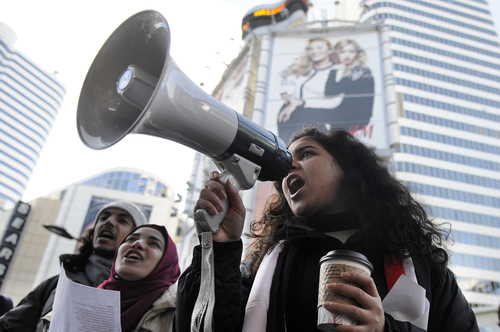Violence Against Women
Source: Green Prophet
Two years after the revolution in Egypt, sexual assaults against women are rising and becoming more violent, says several human rights organizations.
A recent New York Times piece created a storm of reactions with it’s portrayal of the dangers to women in Egypt since the Arab Spring. According to the story, at least 18 rapes ocurred on the second anniversary of the revolution, and Tahir square, the symbol of freedom, has “become a no-go zone for women, especially after dark.” The Times article goes on to describe the increased level of violence of these assaults.
Women’s rights are fundamental human rights and environmental concerns. As the world reacts to the rise in assaults on women in Egypt, it’s going to take more than rhetoric to halt sexual assaults and violence against women.
Amnesty International has joined the voices demanding that effective and meaningful change occurs in Egypt to protect women from sexual assault.
In their 28 page report, they interview seven Egyptian activists working to ensure women’s rights in Egypt. These include Mary Daniel and Azza Hilal Ahmad Suleiman, who are both seeking justice for protesters that have been killed or injured. Engy Ghozlan, Azza Suleiman and Amina Agami are working to protect and defend women from violence, and combat sexual harassment. Manal Tibe is dedicated to defending the right to housing and Ayesha Amin focuses on on-line support for gay, lesbian, bisexual and transgendered people in Egypt.
Their stories can be read in the full report by Amnesty International entitled ‘Fighting for Justice and Human Rights: Egypt’s Women Activists Tell of Their Struggle.”
How is this related to the environment?
Without exception, every major human rights organization, from Amnesty International, the World Health Organization, and World Pulse to the Association for Women’s Rights in Development point to the clear connection between women’s rights and the advancement of sustainable, safe and successful civilization.
The International Women’s Health Coalition’s stance is unequivocal on this.
“The right of women to control their sexuality—the basis for sexual rights—is an indivisible part of their human rights, and that without it, women cannot fully realize their other human rights. This notion has been reaffirmed at several subsequent international meetings, but in practice, few countries’ laws and policies provide women with effective protection against coercion, discrimination, and violence, and fundamentalist states and movements all over the world consistently target women’s sexual and reproductive autonomy.”
While exact numbers are hard to come by, untold numbers of women and girls in the Middle East living under totalitarian regimes encounter rape, virginity tests, domestic abuse, honor killings, mutilation and other forms of gender-based violence on a regular basis. Amnesty Internationals call asks the leaders of Egypt to once and for all alleviate these injustices in the region’s largest country.
How far does that envelop have to be pushed in order to create real and abiding change? Because what’s good for women is clearly good for Mother Earth.
Nicholas D. Kristof, renowned New York Times Op-Ed columnist and co-author with Sheryl WuDunn of Half the Sky: Turning Oppression Into Opportunity for Women Worldwide (2009), declared that, “greater female involvement in society and the economy appears to undermine extremism and terrorism. Now it is emerging that male domination of society is also a risk factor; the reasons aren’t fully understood, but it may be that when women are marginalized the nation takes on the testosterone-laden culture of a military camp or a high-school boys’ locker room.”
Rebalancing the power dynanics between men and women is essential. Let’s see if Egyptian women can be the change the world needs to see.

